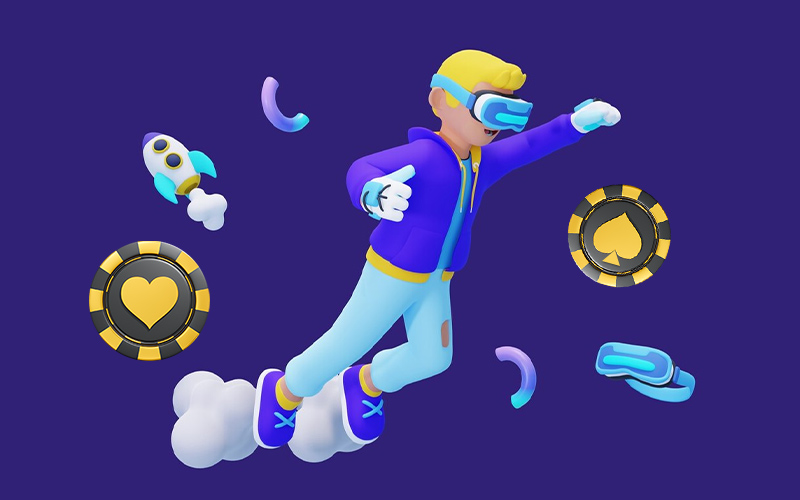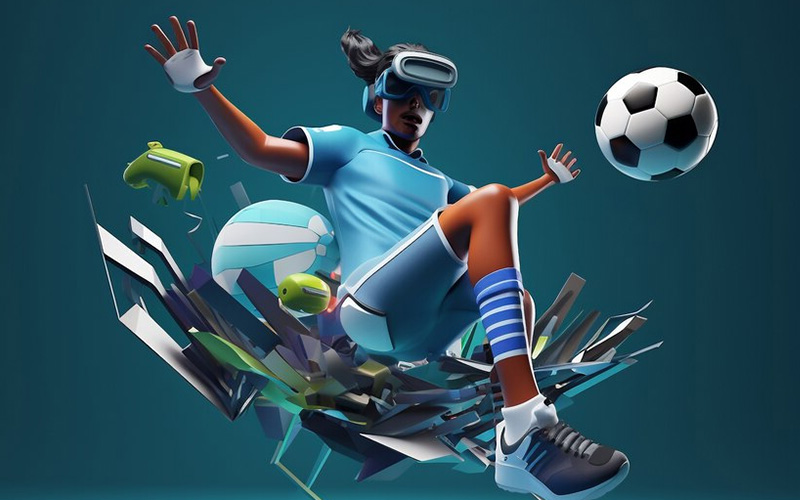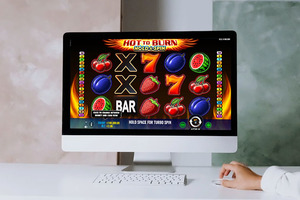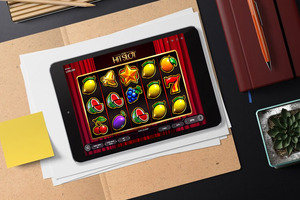VR Casino Monetisation: Payback of iGaming Platforms
Virtual reality has long transcended futuristic fantasies and is becoming a powerful tool in the entertainment industry’s arsenal. In 2026, VR casinos became a full-fledged business model with unique monetisation channels and high user engagement.

What is a Virtual Reality Casino
Using a VR helmet (for example, Meta Quest, HTC Vive, or Valve Index), clients can:
- walk around a virtual room;
- sit at a roulette table;
- play poker;
- chat with other guests or a dealer, just like in offline establishments.
Features of Such Online Platforms
Gaming portals of this type have several key features:
- Immersive experience. Consumers do not just click on the interface but are inside a three-dimensional environment and interact with it using gestures, voice, and head movements.
- Avatars and communication. People can create personalised avatars and can talk to each other via a special chat.
- Realistic graphics and sound. Detailed visualisation of halls, clicking of chips, roulette, and crowds of players create the atmosphere of a real casino.
- Support for cryptocurrencies and tokens. Many VR websites accept bids in digital money or internal coins.
- Built-in social and game mechanics. These are tournaments, VIP zones, interest clubs, microtransactions, and other options that increase interest in the entertainment resource.
Examples of Immersive Casinos
Let us consider iconic projects in the virtual reality niche:
- PokerStars VR. This is one of the most successful platforms of this type. It was opened in 2018, and in 2023, there was a large-scale update with the addition of multi-channel support for AI dealers. Monetisation is carried out through in-game purchases, tournament fees, and premium features.
- SlotsMillion VR. The company was one of the first in Europe to introduce such casinos. Users can play for fiat money, moving around the halls in a special headset. Despite its nature, the project demonstrated high profitability and a 60% increase in retention time.
- XR Casino. This is an innovative portal that applies AR/VR/Metaverse elements with cryptocurrency support. The business model is based on the sale and collection of NFT items, rental of dedicated locations within the metaverse, and White Label integration for partners.
- LiveCasinoVR. The developer focused on authenticity and social interaction. People buy access to VIP rooms, communicate with live dealers in the virtual reality format, and receive bonuses for internal activity.
Advantages in Terms of Monetisation
Reasons why entrepreneurs invest in VR casinos:
- Increased LTV. The average lifetime value of clients is 2–3 times higher than that of a regular gambler. The reasons for the growth include longer sessions, emotional attachment, and in-app purchases.
- Microtransactions and NFT economy. On virtual reality platforms, it is possible to earn on the personalisation of avatars (clothes, emotions, and items), rental of private rooms, VIP passes, and advertising within the virtual space. For example, many providers place banners in the lobby or branded chips.
- Web3 support. Modern projects are increasingly integrating cryptocurrencies, NFTs, and tokenised economies. Consumers receive points for activity, and iGaming brands function as a DAO (decentralised autonomous organisation).
Factors Affecting the Payback of VR Casinos in 2026

Let us consider the nuances that operators should take into account.
Development Time and Cost
The creation of a full-fledged virtual reality resource with support for a multi-user environment, avatars, interactive elements, and physically correct behaviour of objects requires from $50,000 and 8–18 months of hard work.
The return on investment directly depends on the ability to quickly attract targeted traffic and reach a steady stream of income.
Audience and Devices
A limited client base is one of the main challenges for VR casino owners.
In 2026, there will be more than 170 million active users of virtual reality devices in the world (according to Demand Sage) but only some of them are interested in gambling. Cross-platform support (for example, Quest 3, Apple Vision Pro, and PC headsets) will help increase reach, especially among Generation Z and eSports fans.
LTV and Engagement
VR players spend more time in betting sessions (on average, 60–80% more compared to regular entertainment apps), which increases their LTV and contributes to the growth of upscale metrics.
Additional sales are made through:
- purchasing visual upgrades of avatars;
- participation in VIP rooms;
- social tournaments with an entrance fee;
- subscriptions to exclusive VR events.
Microtransactions and In-Game Economy
Ancillary revenue sources include:
- internal purchases (skins, accessories, or private locations);
- brand advertising (virtual stands and banners in the lobby).
A good profit is provided by selling digital real estate in the metaverse (for example, White Label zones).
Marketing and Retention
The high cost of attracting VR players (from $50 to $150 according to the CPA model) requires accurate segmentation and personalised funnels.
Good efficiency in this segment is shown by:
- partnerships with the virtual reality community and streamers;
- gamified quests;
- “referral rooms” — lobbies that can only be entered by invitation.
VR Casinos: Current Challenges and Development Prospects

The technology opens up unique opportunities for the entertainment industry. However, despite the huge potential, in 2026, such gambling portals will remain a niche format.
Difficulties that Entrepreneurs May Face
Key challenges for VR casino investors:
- The limited audience of virtual reality devices. Despite the market growth, less than 10% of the players will have access to high-quality headsets (Meta Quest 3, HTC Vive, and Apple Vision Pro). The main reasons are the high cost of devices, lack of technical skills, and unwillingness to change the usual entertainment format.
- Impressive development expenditures. The implementation of a VR project requires large investments for the provision of the environment’s 3D design, physics, animation, and voice communication. Cross-platform compatibility also plays a huge role.
- Unstable UX and bugs. Virtual reality platforms are quite complicated with regard to technical support. Because of this, performance issues may arise and bugs in multiplayer may appear. Unintuitive UX, in turn, may scare off beginners who were not previously familiar with this format.
- Legal uncertainty. Most regulators (MGA, UKGC, and KSA) do not have a separate regulation of VR gambling. Licences of these jurisdictions often do not take into account the aspect of digital interaction. There may be questions about KYC/AML when using avatars. Security and behaviour control in the VR space is also not yet standardised.
- Difficulties with scaling. Traditional marketing channels (affiliate, CPA, and SEO) are ineffective in such a niche. High-quality promotion requires deep gamification, community marketing, as well as interaction with metaverses and Web3 portals.
Prospects and Growth
Let us consider what awaits the sector in the coming years:
- Increased audience. Every year, special headsets are becoming cheaper, lighter, and more convenient. According to IDC, sales of AR/VR products are expected to grow in the next 2–3 years. It is predicted that by 2027, annual shipments of virtual reality solutions will reach 30.3 million units. About 15–20% of the equipment’s owners are going to be actively involved in entertainment with bets or simulation elements.
- Integration with Web3 and metaverses. Today, VR casinos are already becoming part of a wider infrastructure. In the future, we can expect a rise in the popularity of NFT lotteries, avatars, tokenised prizes, DAO management, and the sale of virtual real estate for gambling brands. All these functions will be successfully integrated into the immersive environment.
- Higher LTV and engagement indicators. On average, users spend 2–3 times more time playing, are more willing to interact with additional functions and actively participate in tournaments or social mechanics. This increases ARPU and LTV, especially in combination with microtransactions.
- The emergence of White Label resources. It is expected that software vendors will offer ready-made frameworks for launching VR casinos. This will lower the entry threshold and expand the market for operators.
- Regulatory updates. In the future, gambling commissions (primarily in the EU and the UK) will begin to raise standards: KYC requirements in metaverses, rules for monitoring avatar behaviour, and client protection principles in immersive environments.
The Main Things about VR Casinos
It is a new format of interaction with the audience, capable of not only engaging but also creating an ecosystem with multiple monetisation points.
Aspects that entrepreneurs should take into account:
- The key task of operators is to competently build the economic architecture where every step becomes part of the overall business model. Internal purchases, NFT assets, advertising campaigns, and collaborations with niche brands will help increase the profitability of immersive casinos.
- Current challenges in the virtual reality industry are related to infrastructure, regulation, and audience reach. In the next 2–3 years, successful projects will appear at the intersection of VR, Web3, and a powerful gaming community.
We will create a detailed business plan, take care of licensing, and promote your casino startup.
- e-mail: info@2wpower.com
- Telegram: @Win2Power
Please be careful! We have noticed that scammers are using our contact details to deceive customers.
For security reasons, please use only the contact information provided on the page https://2wpower.com/en/feedback
Our company is not responsible for the actions of fraudsters.












 DEMO
DEMO 



